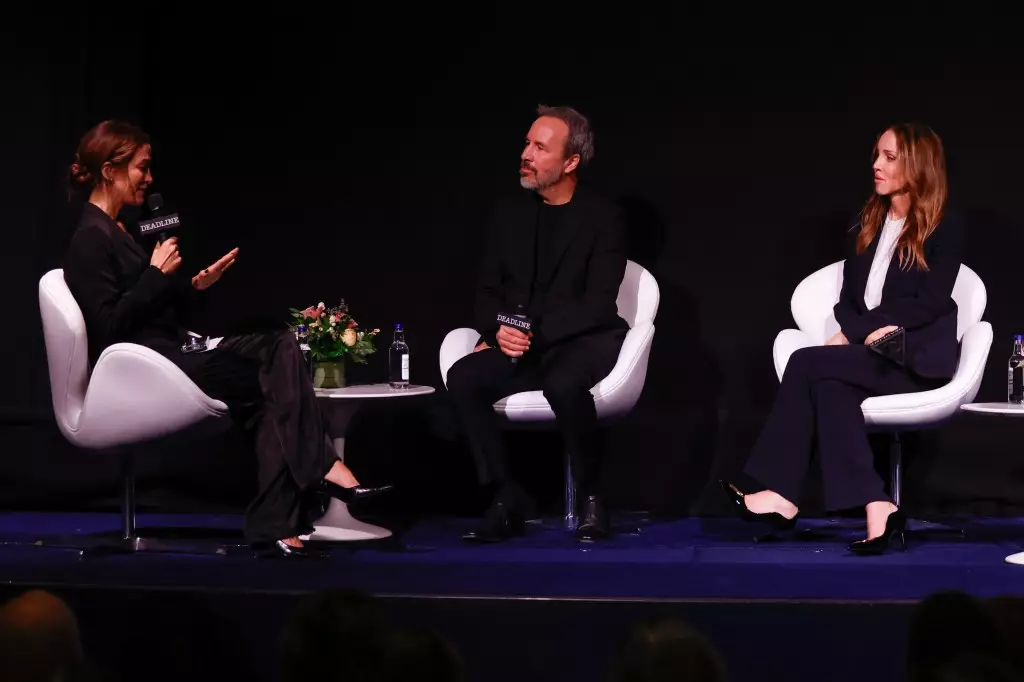The recent release of “Dune: Part Two” has not only captured the audience’s imagination but also reasserted the significance of Frank Herbert’s original narrative in today’s world. During a panel at Contenders London, director Denis Villeneuve and producers Mary Parent and Tanya Lapointe provided insights into the film’s thematic depth and its pressing relevance in contemporary society. Their discussion illuminated the rich tapestry of elements interwoven throughout the film, from potent social commentary to the universal story of love.
At the heart of Villeneuve’s adaptation is a commitment to preserving the essence of Herbert’s work. Villeneuve noted his ardent desire for the film to serve as a warning against the allure of charismatic figures who wield power and the potential dangers of intertwining religious motives with political aspirations. It is a cautionary tale that resonates strongly today, reflecting our ongoing struggles with leadership and morality. The film’s protagonist, Paul Atreides, embarks on a deeply personal journey for vengeance against those who have wronged him, embodying the consequences of power and betrayal.
The film navigates themes that remain relevant decades after Herbert penned the original novel in the 1960s. As Parent poignantly expressed, humanity continues to grapple with fundamental issues such as warfare, environmental stewardship, and interpersonal relationships, highlighting Herbert’s foresight and the cyclical nature of history.
While “Dune: Part Two” dives into the complexities of power play and revenge, the relationship between Paul and Chani emerges as a vital narrative anchor. Parent emphasized that their romance is central to the film, depicting young love as both beautiful and fraught with challenges against a backdrop of chaos. This poignant relationship is not merely a subplot; it defines the emotional core of the film, offering viewers a relatable connection amid the grand narratives of battle and strategy.
Villeneuve shared his profound belief that the essence of the story lies in this romantic journey—two young individuals, madly in love, are confronted with a turbulent world. This dichotomy enhances the story’s impact, illustrating the vulnerability and strength of love in the face of adversity.
The producers, particularly Lapointe, shed light on the intricate portrayal of power dynamics within the film. The depiction of entities such as the Bene Gesserit speaks to a far-reaching understanding of influence—an understanding that extends beyond immediate calculation to one that spans generations. Power in “Dune: Part Two” transcends the surface-level machinations of politics; it evokes an age-old talent for strategy, one that intricately finds its way through deceit, manipulation, and foresight.
The film’s layered approach to power also emphasizes the importance of female agency throughout its narrative. Villeneuve’s commitment to portraying strong, autonomous female characters is evident, dispelling the notion that their roles are defined solely by their relationships to male characters. Lady Jessica, for instance, embodies an alliance between personal motives and broader societal ambitions, illustrating that women in positions of influence have their own stories, motivations, and complexities.
As the panel came to a close, Villeneuve expressed a playful yearning for a third installment that would delve deeper into the themes of warfare—an element that further complicates the narrative. The idea that saving one’s loved ones could necessitate engaging in war paints a grim but essential picture of the sacrifices and moral dilemmas that accompany power struggles.
The filmmaker’s willingness to explore these themes more profoundly speaks to his dedication to delivering a comprehensive and genuine adaptation of Herbert’s epic saga. As audiences reflect on both “Dune: Part Two” and its predecessors, it becomes increasingly clear that Villeneuve’s rendition encourages a deeper understanding of the human experience while remaining rooted in the narrative’s multifaceted layers.
“Dune: Part Two” transcends mere entertainment; it invites audiences to engage critically with pivotal themes of power, love, and the weight of legacy. The collaboration of Villeneuve, Parent, and Lapointe has birthed a cinematic experience that demands to be explored, understood, and discussed, aligning Herbert’s vision with the contemporary challenges we face in our own world.


Leave a Reply